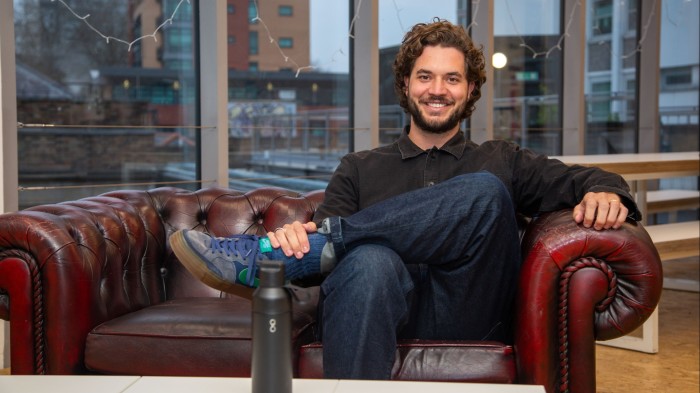Nick Doman went to business school in search of a place to explore start-up ideas and to build his network. Then, one day in class, he sat down next to Will Pearson, who would eventually become his business partner.
“It was serendipitous,” says the 30-year-old entrepreneur. “We sat next to each other and spoke to each other at every lesson for the first semester in 2017.” Fast forward to today, and their company, Ocean Bottle, which sells reusable plastic bottles with social impact in mind, is on course to turn a profit this year, according to Doman.
Although Doman’s meeting with his co-founder at London Business School (LBS) while studying for a masters in management might seem random, it is anything but. Thousands of people head to business schools to build a network, nurture ideas in the hope they will strike it rich, and do good for society.
From weekends spent discussing ideas over pizza and beers to competitions where the winners receive cash prizes and mentoring, business schools — through their incubators — are increasingly playing a role in nurturing a new generation of entrepreneurs.
With purpose comes profit. We don’t have to trade one for the other
Ideas that make an impact are often simple. In the case of Ocean Bottle, for every bottle that customers buy, the company collects 1,000 plastic bottles to help reduce waste in the environment.
“I came up with this idea, to place purpose at the forefront of what we did,” Doman says. “With purpose comes profit. We don’t have to trade one for the other.”
Some educators observe that Doman is typical of a generation of entrepreneurs who often want to do good as well as make money. Jane Khedair is the former head of LBS’s incubator and now leads the LBS Institute of Entrepreneurship and Private Capital.
“The focus of the founders is different from 15 years ago, when they were purely commercially minded and cared about securing an exit with a decent valuation,” she notes. “Now their motivation is doing good for society.”

Entrepreneurs are also more educated than previous generations, says Bo Becker, of the Stockholm School of Economics. “It used to be the case that you needed to graduate if you were going to work in the system, but [it was] not as crucial if you were going to be an entrepreneur. Now, a lot of entrepreneurs graduate — and the typical founder tends to be more educated than in 1985.”
Business education and incubators are playing important roles in nurturing modern entrepreneurs, says Andrew “Zach” Zacharakis, professor of entrepreneurship at Babson College, which has a strong focus on the subject. The notion of risk features prominently in the schooling of future business leaders, Zacharakis says. “We work throughout all of our programmes to help students to move into situations that are not overwhelming, trying to help them reduce the risk and identify the opportunities.”
Today, most people in their twenties and thirties will have six or seven careers. Entrepreneurship is a way of taking your destiny into your own hands
Zacharakis argues that it is important, both for consumers and entrepreneurs, that business schools and universities foster entrepreneurship. For consumers, he says, “radical innovations” that benefit society tend to happen outside large corporations.
Entrepreneurs benefit, too. “Back in my parents’ day, companies could guarantee lifetime employment,” he says. “Today, most people in their twenties and thirties will have six or seven careers. Entrepreneurship is a way of taking your destiny into your own hands.”
Goulnara Aguiar, a 43-year-old Russian business founder and Insead alumna, decided to take on the risks of becoming an entrepreneur because of the lifestyle it could potentially allow.
“Being ‘part of the system’ is also being part of the bureaucracy system — and I love freedom too much,” she says. “I had enough experience, and I felt confident to start something, as I am a creative person. I wanted to do something that makes sense for me and my children.”
Aguiar founded Ormex, a registry for carbon storage in agriculture. “Insead helped me understand that it can be possible to have a viable business in areas where our society needs it,” she says.
FT Global MBA Ranking 2025

This article is from the MBA ranking report, out on February 17
Nancy Hsieh, executive director at the Rudolf and Valeria Maag Insead Centre for Entrepreneurship, says students who participate in the centre’s one-year programme usually have a business ready to launch by the end of the course. Insead also runs a venture competition twice a year, after which the winners are paired with mentors to work on perfecting their business idea while studying at the French school.
Hsieh says participants are encouraged to reach a “minimum viable product”, whereby they leave with the basics set up, including a website. Students also get to pitch their ideas to a panel of investors and entrepreneurs.
“We foster a safe and supportive, but also rigorous, environment that sets them up for the real world,” she says.
And Hsieh believes that wider society benefits as a result. “Entrepreneurs create value,” she says. “They create jobs and bring new solutions to problems that already exist, but that haven’t been addressed before in a certain way. They are looking at things with fresh eyes.”








